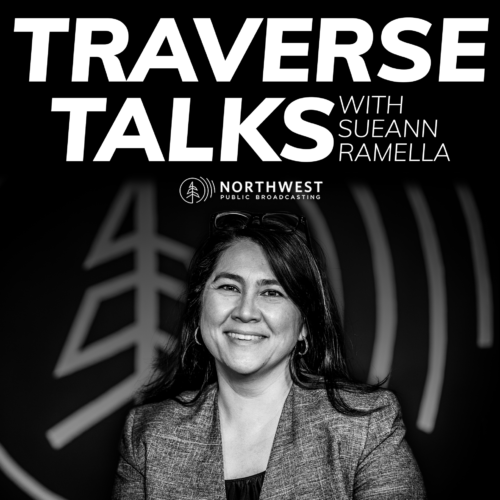
Psilocybin: Psychology, Policy and Possibilities – ‘Traverse Talks’ Episode 41 – With Sam Chapman
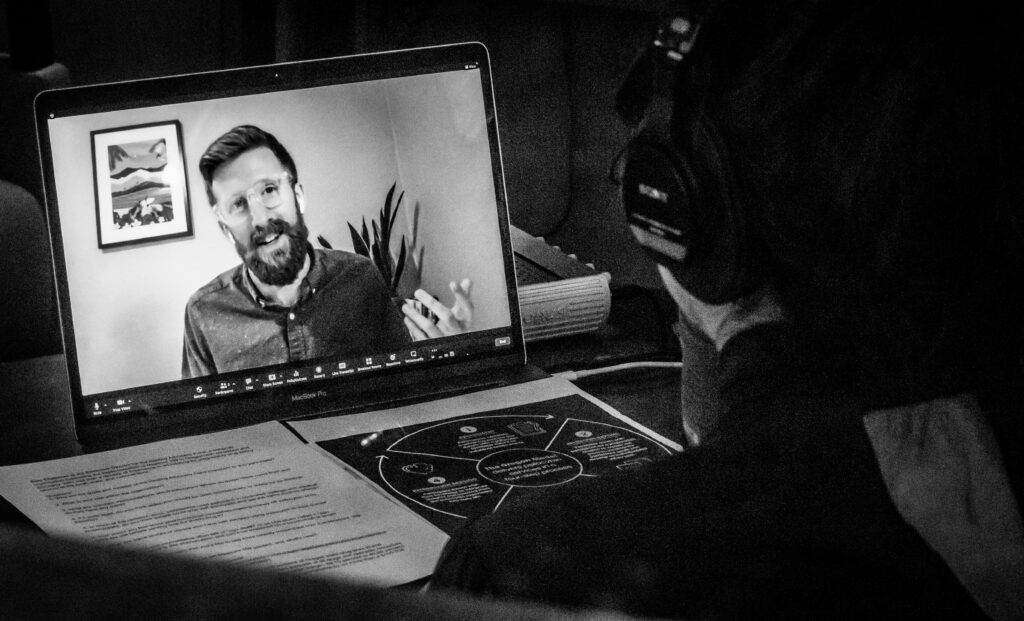
What do you really know about psilocybin, commonly known as magic mushrooms? Research on the substance has lagged behind in the U.S. but recent grassroots movements and nonprofits are slowly turning the tide on the public’s perception. Sam Chapman is the executive director of the Healing Advocacy Fund a nonprofit based in Oregon dedicated to development and implementation of the nation’s first regulated psilocybin therapy program. In this episode of Traverse Talks with Sueann Ramella, Sam Chapman debunks some of the common misconceptions about this hallucinogen and delves into the practical application of using psilocybin to treat mental illnesses such as depression, anxiety and post-traumatic stress disorder (PTSD.) Listen to learn why Sam believes in the decriminalization of all drugs and why everyone deserves education on this misunderstood mushroom.
SUBSCRIBE: Spotify / Apple Podcasts / NPR One / YouTube
Listen
Conversation Highlights:
Laying The Groundwork:
Sam Chapman: Measure 109 is the first ever statewide legal psilocybin therapy program where anyone over the age of 21 can have access to licensed and regulated psilocybin therapy that will take place at a supervised service center under the supervision of a facilitator.
Sueann Ramella: Why?
Sam: So even prior to the pandemic, you know, Oregon had been facing it a very acute mental health crisis, and I think one in four people who were experiencing some level of depression or anxiety. And I think that it doesn’t take much effort for any of us to think about, if not ourselves, people who might be struggling, whether it be with depression, anxiety, et cetera. And while there are certainly options out there that work for some people, there’s a lot of people falling through the cracks of our current mental healthcare institution. And we really believe in psilocybin showing real promise for those who have not been helped. We don’t believe it’s a panacea. It is certainly not a cure-all, and it’s not for everyone. But in terms of adding a powerful tool to the toolbox, we felt very strongly that now was the right time to introduce psilocybin services to the general public here in Oregon, and I think we’ve been successful so far, but we have a lot of work to do in developing the rules and regulations, and really ensuring that the foundation of this program is solid so we can continue to build and ensure that as many people as possible that stand to benefit from having access, have access over the years to come.
Sueann: How difficult is it to establish a foundation for a statewide program that has to do with something people may still think is really bad?
Sam: Right now a lot of our work is really based on education. You know, the number one opposition we’ve gotten [during] the campaign wasn’t actually opposition. It was a lack of information on what psilocybin was, how it worked and who stands to benefit. And while the campaign won with 56%, which was incredible for the first time anything like this had ever been introduced, there’s still a lot of education to be done with the general public, with elected leaders, with local governments, and with the general voting population overall that supported this. You know, I’ll be honest, this is the first time a state program like this has ever been created. So while we absolutely have experts in a huge spectrum of areas from Indigenous community stakeholders that have been involved in psilocybin ceremony and healing practices for over, you know, hundreds if not thousands of years from, you know, that span of time to medical professionals that are absolutely working at the federal level in clinical trials in a much more regulated and rigid environment, we’re bringing all of these people to the table here in Oregon and really trying to utilize all of their experience to craft a program that is not neither a medical program or a recreational program. It is really a wellness program that provides a new path. And paving that new path is a challenge. It is hard work, but it is what I believe to be the righteous opportunity that we have in front of us here in Oregon to create a foundation that can continue to evolve and expand and really be hopefully a gold standard for other states and countries around the world to follow.
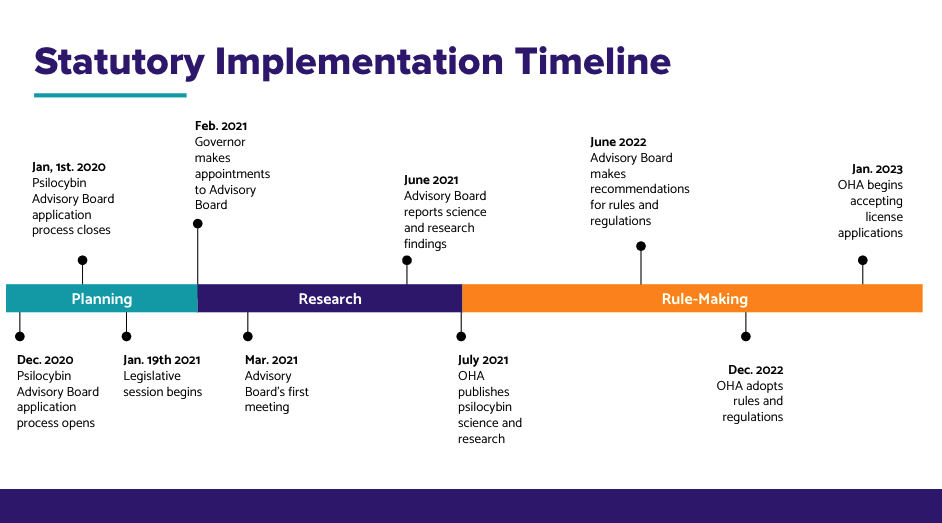
Healing Advocacy Fund Timeline of Statutory Implementation (Courtesy: The Healing Advocacy Fund)
How Does It Work?
Sueann: So far the plan that I see, if we could walk the listener through it, is there’s an assessment and then you do background about their needs where they are—like you mentioned—maybe past traumas or perhaps they’re on medication, then they go to a different level of assessment. I think in what I read, a clinician helps further figure out where they are and if this is something that is viable for them and with a professional who’s with you while you’re taking psilocybin in pill form.
Sam: Or if the natural mushroom is [allowed] and [depending on] what form that will come in, it will need to be taken orally.
Sueann: Are we gonna call it a trip or a session?
Sam: You know, I personally don’t like the word, “trip” only because it has a negative connotation that leaves people to false assumptions. And to unpack what I mean a little bit: the word, “trip” came from people who have bad experiences. And unfortunately that is part of the stigma, is that it’s the mushroom itself that is causing this bad experience. And in my personal experiences and my research and with all of the hundreds, if not at this point thousands, of people that I’ve talked to in this endeavor, it’s not the mushrooms, it’s the set and the setting and the environment that makes up whether or not you have what would be deemed, “a bad trip.” Now let me be clear, that doesn’t mean that even in those settings, that adverse events cannot still happen, they can, I think that they’re going to be rare, but I do think that we need to be real and expecting that there will be adverse events…
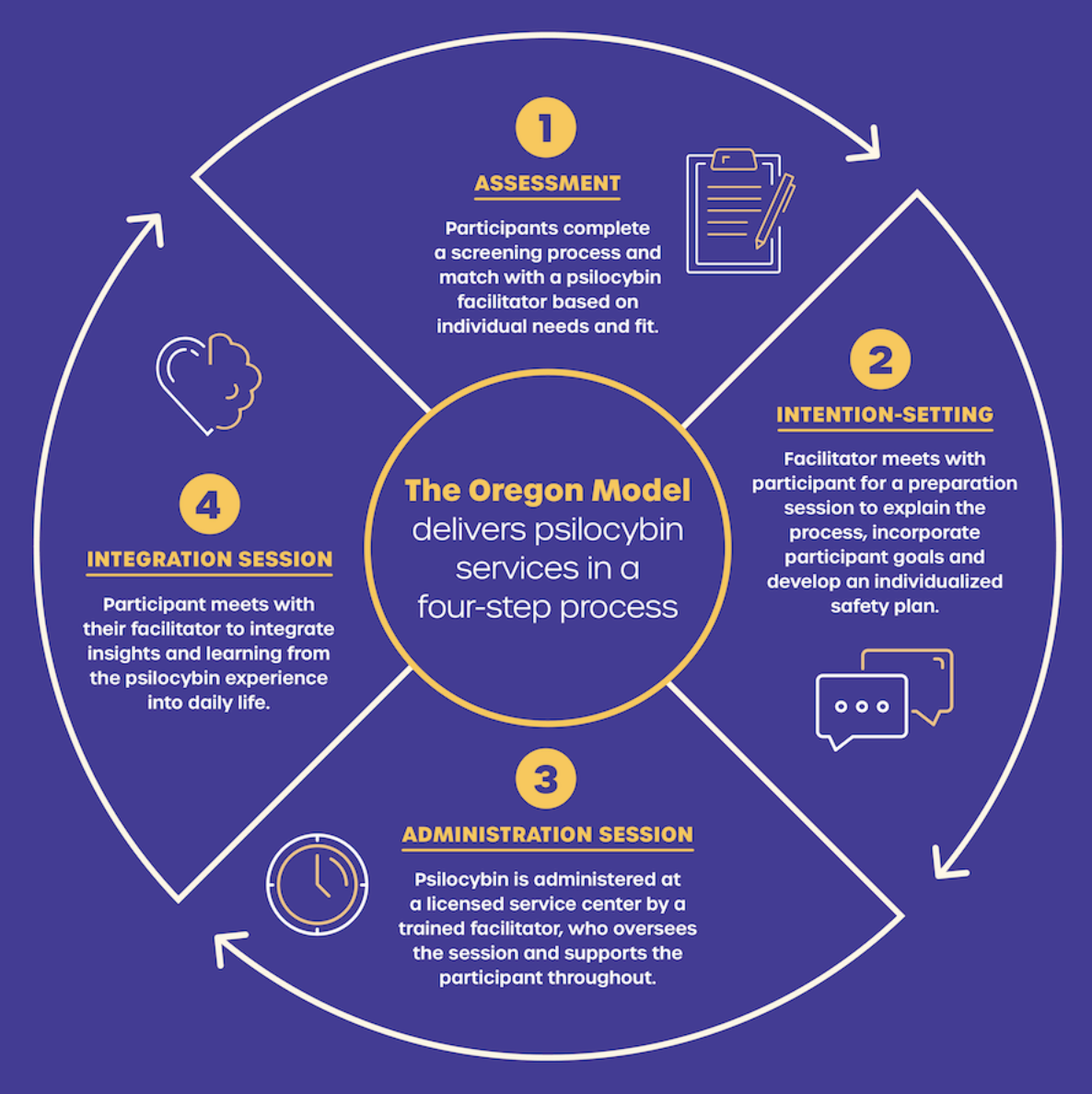
The Oregon Model (Courtesy: The Healing Advocacy Fund)
Sam (continued): And it’s so important that we create a safety plan for those situations, which is also a required aspect of this process. Regardless of whether or not you have no health history [to] report at all, or you have a ton of health history that needs consideration. Everyone in this program is gonna have a specific safety plan that is tailored to their needs from medications to after the session integration. What’s your plan for getting home and what types of support might you need after a psilocybin session, right? The concept of integration is so important here. While integration is required to be offered after a session, it’s not required to be taken, we heavily encourage it as so many of the positive benefits come from integration, really working through and reflecting on the experience and taking the pieces of that experience and bringing them back and starting to really insert them into the rest of your life and carry those lessons forward. The more that people are able to do that, the more that we see the prolonged positive effects of the session, and so that’s a little bit of the process and the importance for creating space for, you know, the safety plans and the support networks that we all need in general outside of a psilocybin program. Right? But [those] are especially important within this program and I think are really an essential factor for the foundation of safety in this program being a success.
Decriminalizing All Drugs:
Sueann: What’s another misconception? Because I can hear my mother already, “It’s addicting!” but I think she thinks everything is addicting.
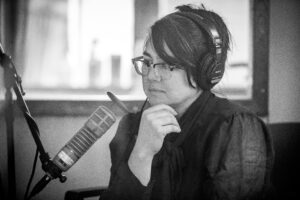
Sueann listens with curiosity.
Sam: Yes, yes. There is absolutely the unfortunate reality that psilocybin and many other psychedelic drugs get lumped in with the idea that all drugs are bad, right? We are still very much having to deal with the failed propaganda of The War on Drugs, which turns out isn’t actually war on drugs, it’s a war on people and very often a war on people of color. And I think that we need to acknowledge that in this process and continue to remember that while we are creating these new programs and opportunities, there are still people in jail for drugs and for doing things out of the goodness of their heart. And that is why I really encourage other localities and states who are considering, you know, creating a program like this to also remember: we cannot allow psychedelic exceptionalism to run rampant. We have to remember that there are people out there that have been disproportionately targeted by The War on Drugs and they stand to benefit from this too. And we need to acknowledge the failed War on Drugs has real implications for people in their day-to-day lives. And so that’s why I’m a big advocate for decriminalization of all drugs and licensed and regulated programs that allow for a broad population of people who are interested to have access in a safe and supervised and licensed type of environment.
Sueann: Hmm, Sam, what about methamphetamine? Decriminalizing that … is that helpful to society?
Sam: I believe that people have the right to put whatever they want in their body and whether people like that or not, that is a truth. And I believe that keeping drugs illegal and treating substance use or substance abuse as a criminal problem has failed. And I think there’s a lot of science to back that up. And so I support the decriminalization of all drugs. We should not be putting people in jail for drug use. Period.
*Question and responses were edited for length and clarity.
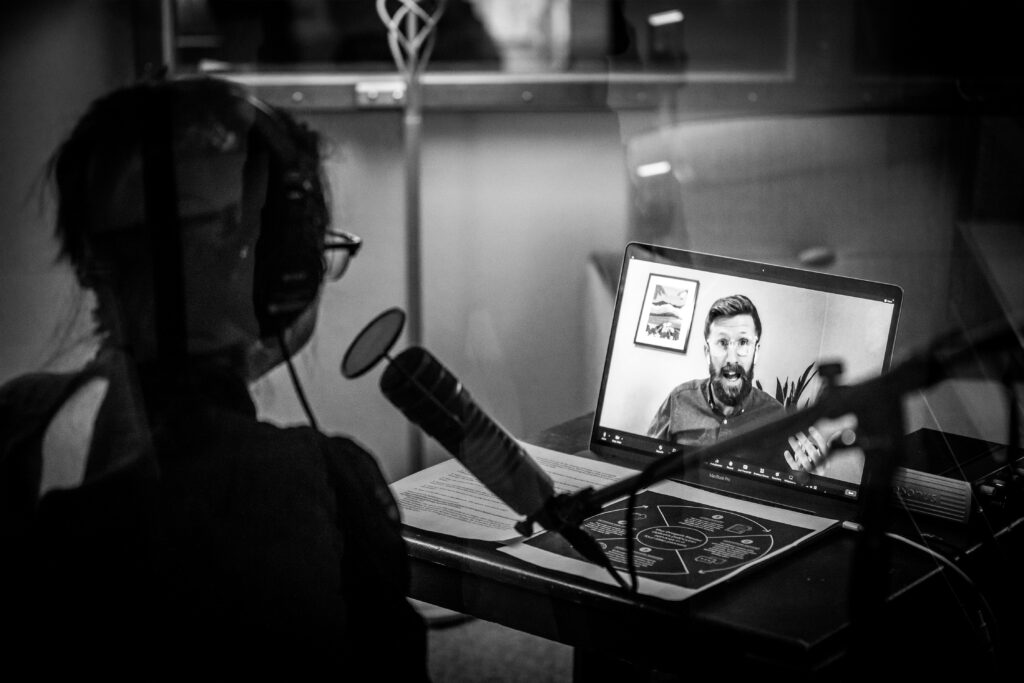
Related Stories:
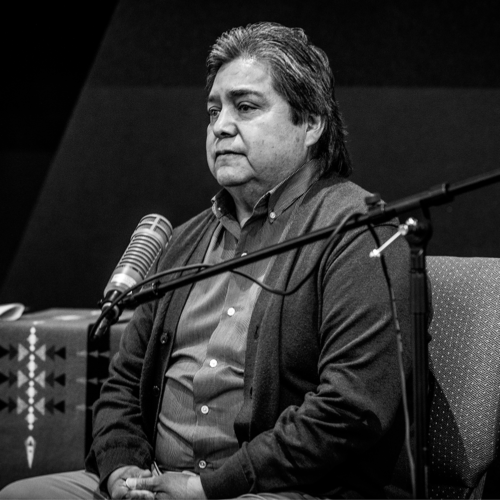
Captive Returns Home: The Story Of Wetxuuwíitin – ‘Traverse Talks’ Episode 42 – With Chairman Samuel Penney
Photo of Sam Penney recording Traverse Talks at the Nez Perce National Historic Park on March 10, 2022. Imagine a stranger took your family’s heirlooms and then offered you an
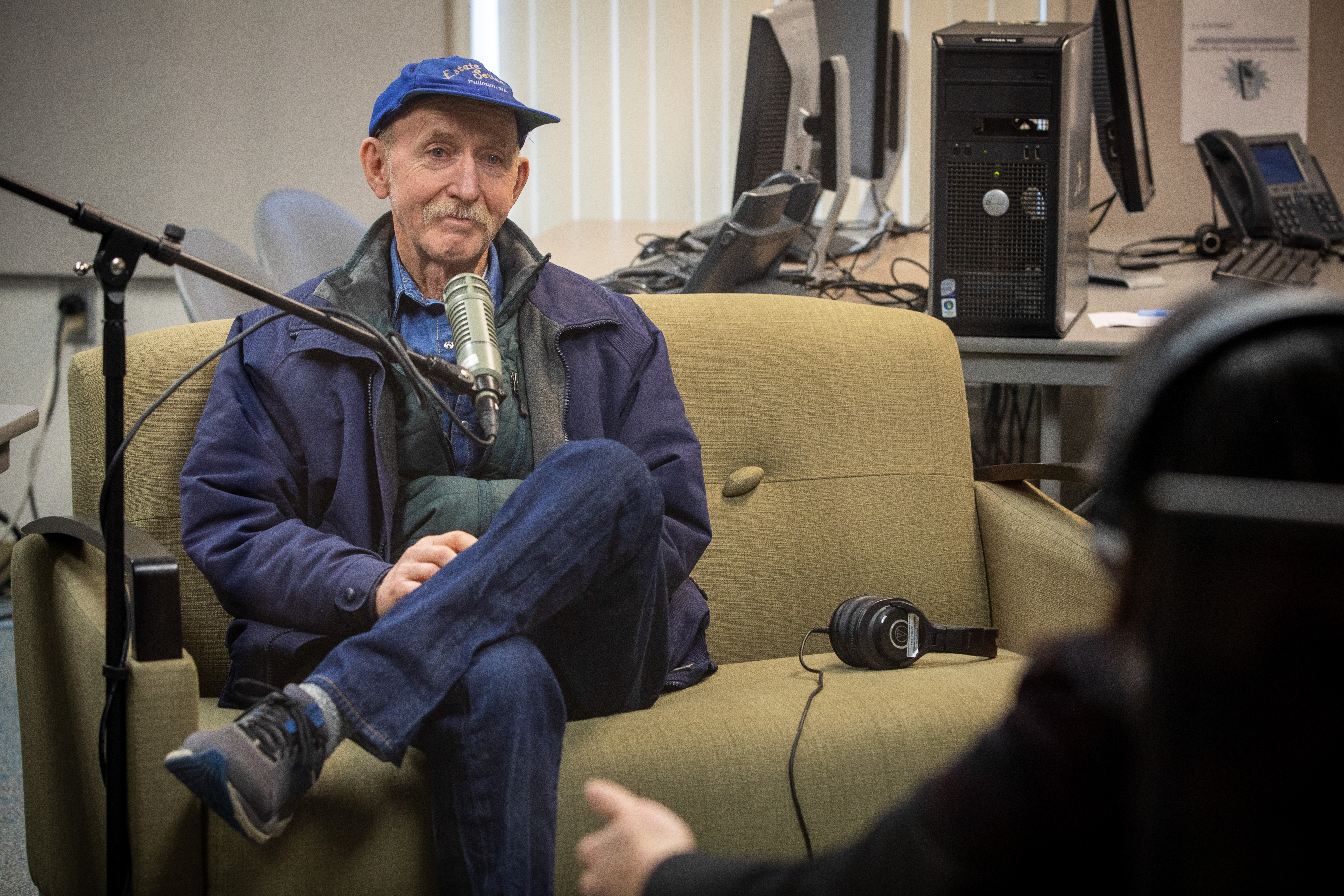
You Inherited A House Full Of Stuff. What’s Next? ‘Traverse Talks’ Episode 38 – With Estate Services Owner Rich Old
Rich Old recording this episode of Traverse Talks on March 3rd, 2022. Grieving the loss of a loved one is already hard enough. To make matters worse, many people have
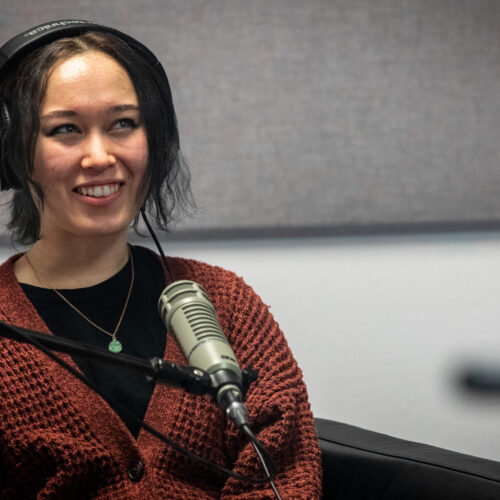
Would You Sacrifice Humanity For A Chance At Divinity? ‘Traverse Talks’ Episode 37 – With Author Zoe Hana Mikuta
Zoe Hana Mikuta recording Traverse Talks in the KTVI Tacoma studios on December 4, 2021. Zoe Hana Mikuta is the young author of the YA science-fiction novel, “Gearbreakers” and its

